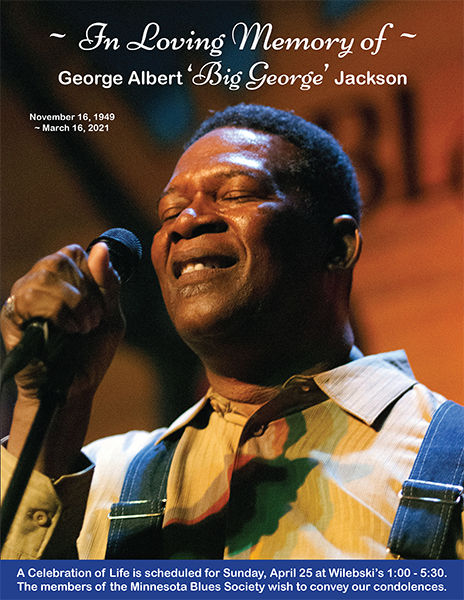Big George Jackson Profile
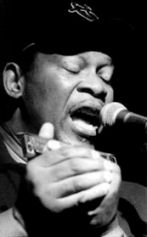
Big George Jackson
Featured Musician —
George Albert Jackson
Born November 16, 1949 in Minneapolis, Minnesota
Songwriter, Harmonica & Vocals - Traditional Blues Music
Interview prepared by Lynette Rounds with assistance from Judy Cedar.
Plays on Releases:
- Big Geroge Jackson Blues Band: Back At It!, 2013, Self-published
- Big George Jackson Blues Band: Southern in My Soul, 2003, Black & Tan Records B&T016
- Big George Jackson Blues Band: Big Shot, 2001, Black & Tan Records B&T009
- Big George Jackson: Beggin' Ain't For Me, 1998, Black & Tan Records B&T003
- Big George Jackson & Serious Bidness: Nothing Like the Rest, 1994, Cold Wind Records CWR 9404-2
One can go to the band website, www.biggeorgejackson.com, and read a description of George that starts by saying he is known around the Twin Cities as "the authentic big man of the blues" and goes on to say that he sings with a distinctive bass-rich voice only a six-foot, six inch gentle giant could be blessed with. George's songwriting, in so many ways, honors his family and his upbringing. George's lyrics most often speak to his own personal experiences and often honor his upbringing and family. So we begin this profile with an interview of his mother and father and round it out with an interview with George.
Francis Bernard, nicknamed FB, and Annie Laura are George's parents. They were interviewed by Lynette Rounds on January 14, 2004. Lynette and her five sisters and one brother grew up living next door to George, his five brothers and his one sister. Annie and Lynette's mom were good friends.
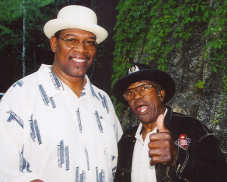
Big George with Bo Diddley in Germany
Annie says "I love the stories" when she starts talking about George's music. George's lyrics tell stories that are real. Annie goes on to say how pleased she is that George is advancing with the music.
FB and Annie both love music. They like all kinds of music including blues, jazz and R&B. Radio or records were played regularly. Some music George heard as he was growing up includes Jimmy Smith, Johnny Taylor, Little Milton, Albert King, Sonny Boy, and Blind Boy Phillips. Francis and Annie loved jitterbuggin' and especially to the Louis Jordan song Shoe Shoe down at the Cozy Bar in Minneapolis.
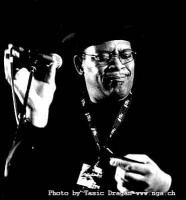
Photo by Tasic Dragan
FB was raised in Macomb, Mississippi and he acquired a liking for music as a child. In the evenings, after working in the fields, there would be music. Someone would play a guitar and others would sing or whistle. FB started playing a harmonica around age 11 but it was always just for fun and he'd try to make it sound like a bird whistling or try to play like Sonny Boy or Blind Boy Phillips. That love of music continued with FB's family and George, too, acquired a liking for music as a child. FB says George was only three or four years old when the family got a piano. After FB got off work at Minneapolis Moline (he worked there for 25 years and George's song "20 Years" is about that) sometimes he would just sit and play his harmonica or "bang" on the piano. George picked up the interest. Annie remembers George and FB playing a harmonica duet on the back porch one day when George was about 14 years old. That is the day Annie realized that George had a gift for the music. But, according to Annie, George didn't get serious about wanting to play harmonica professionally until he was in his late teens. Annie says George is self-taught and he has always had a beautiful voice.
Plenty of George's songs are real stories about life and living. For example, FB would do rubbish hauling Saturdays and some evenings as a second job. George's song "Rubbish Truck" calls out all the boys' names and that is just how it went too - FB would be calling them to get up because the boys had to help.
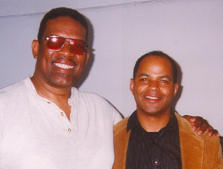
Big George with Guy Davis
Annie says the boys were never late for school because they would run downstairs to the kitchen every morning for biscuits and Sandy (the youngest of the boys) was usually the first one to the table! "Biscuits 'n' Molasses" reminds Annie of those school mornings. Annie would have to buy 25 pound bags of flour at a time for her large family. A typical breakfast would be biscuits with Georgia's Alaga Syrup, pork jowls, grits and scrambled eggs.
"Ela May" is a song to honor George's sister who did so much of the cooking for the family. Ela May learned how to cook when Annie was away evenings to work in the Loring Park Office Building. When the boys helped out Ela May and when they finished all their chores, Ela May would make them cookies or sweets as a reward.
Annie said she was a bit worried about the song called "Crosseyed Annie." Annie isn't cross eyed! When she asked George about the song, he explained that the Annie song has bits and pieces of lots of people he knows all rolled up into one song.
FB and Annie had to mention "Southern in My Soul." George is northern born but he has all the southern "make-ups" because of his rearing. The kids all drank kool-aid from mason jars just like his relatives that live in the southern states. Annie and FB took vacations and headed south with the kids to visit the relatives.

Hose' O Levy, Big George & Johnny Jones
Annie came to Minneapolis from Memphis and met FB in the '40s. They met through mutual friends during an outing to Excelsior. They began to date and sometimes they would return to the lake to just sit and watch the sun rise. They got married and raised a large family. George is the second oldest of eight kids: Ela May, George, Francis, Ellis, Myron, Lori Ann, Dean (Pooky) and Sandy. Annie says George was a silly kid - all the boys acted silly but they always had fun. George's nickname was given to him from his family; he just shot up and got tall all of a sudden and pretty soon he was Big George!
Annie is glad George's songs tell stories and that playing music makes George so happy. FB is glad some of his passion for music rubbed off on George because George has music talent. FB and Annie get out as much as they can to hear George play.
If Annie were to give George any advice, she would tell him "keep tellin' the real stories." FB says he is happy that George has music talent. If FB were to give George any advice, he would tell him "just keep moving, just stay at it and never give up the music."
When talking to George, he agrees that music did grow on him as a kid. The kids he hung out with listened to BB King and Bobby Bland. He had a good friend named Sonny who had records of the older artists and Sonny turned George onto their music. And when he babysat for his sister's kids, he would go through all her records and listen to those. When talking about which artist knocked him for a loop and led him in the direction of harpist, he credits Big Walter Horton. "Horton has tone that is cool and technique that is great," says George.
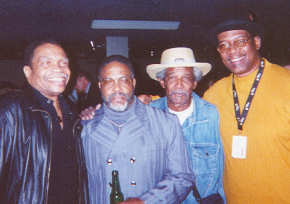
Otis Clay, James Nixon, Lazy Lester & Big George
George really did not have a mentor that paved the way for him in the music business. He talked to players and guys and got ideas from them but he pretty much walked the pavement and knocked on doors to get gigs. And he used the study method to learn his trade and is especially fond of a book he used that focused on blues and country western harmonica playing. George says he hasn't mentored other musicians, but his band members claim otherwise. According to Dwight Dario and Phil Schmid, the impact George has had on the band members since 1996 has been significant. They have all enjoyed wonderful opportunities and experiences both here and abroad. In Dwight's own words, "it has been effortless to play in this band and that's that!" George participated in a one-day educational program for school kids in Switzerland with James Nixon and he described that experience as a privilege.
When asked what he likes most about our local blues scene, he instantly replied, "we have musicians here who haven't turned their back on authentic blues and they play blues the way it should be played so the spirit of the music comes across." George went on to say that the blues music came down from heaven perfect and he thinks it is important to keep playing the blues true.
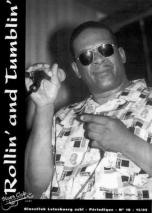
Poster for Club in Europe
George talked some about the 1960s when there was a great blues scene in the Twin Cities. George remembers when we had real blues clubs that stuck to playing blues music all the time. That has changed and George sees that as unfortunate and a weakness of our blues community today. George remembers in the 90's telling his pharmacist friend to go check out the blues at a venue then called Biscuits and Blues in downtown Minneapolis. The night his friend went, the "blues bar" was playing alternative rock. George knows the area has a good underground, grassroots blues community. But George is sad that they keep getting jacked around. George sees blues music as a culturally significant art form and he thinks it is unfortunate that it doesn't get much air time on local radio stations other than KFAI. He hopes that will change.
For the new, aspiring musicians, George suggests that when they start playing music they find out who did the song, originally, and listen - really listen - to hear how it was performed by that artist.
When George isn't performing on stage or working his daytime job (of more than 25 years at Minnegasco), he loves to hunt and fish. He is an avid reader and is studying to speak Spanish. He loves to cook and is known for his gumbo, peach cobbler and scrambled eggs. George admits he reads cookbooks like other people read novels. George also keeps busy with family and he has a host of kids and a host of grandkids. When he's not playing or listening to blues music, George likes to listen to old country western music.
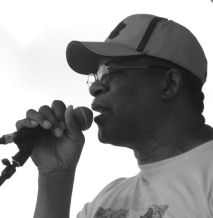
Big George at Santiago 2007
George's favorite blues club when he is gone away from the Twin Cities area is a small, warm, intimate club named Café de Koster in Groningen, Holland. The Big George Jackson band agrees it is fun and energizing to play at Café de Koster. The owner, Wilhem, and the patrons are enthusiastic, knowledgeable, intelligent blues fans. The bartender, Robb, is the band's driver when the band is touring Europe. George says the first time he played this club he had a sense of deja vu.
The Big George Jackson Blues Band consist of Big George Jackson (vocals, harp), Jeremy Johnson (guitars, drums, miscellaneous percussion, Phil Schmid (guitars, miscellaneous percussion), Dwight Dario (drums) and John Schroder (bass).
George plays Hohner Marine Band, Special 20 and Super 64 Chromatic Harmonicas. He uses a 1967 Blackface Bandmaster Head Amplifier (4 x 10 cabinet) and a 1952 original Silver Bullet mic.
(Spring 2004)
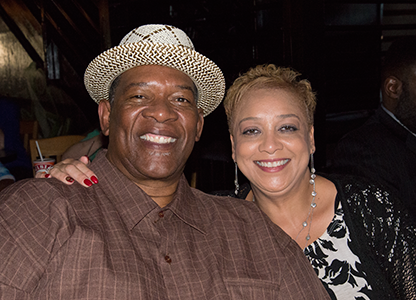
Big George and Tonya HOF 2015
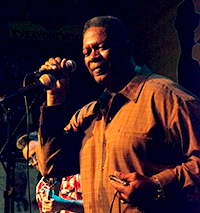 My old friend, John Schroder, called last night to tell me that his longtime bandmate, Big George Jackson had passed away.
My old friend, John Schroder, called last night to tell me that his longtime bandmate, Big George Jackson had passed away.What a tremendous loss this is for anyone who ever crossed paths with George. Of course, his music was a great gift, but beyond that, he was a great human being. Whenever Melody and I would go to see him perform, he always took time between sets to welcome me with a handshake and Mel with a bear hug. Then we would talk about everyday things, about life. He was really down to earth and made everyone feel comfortable and welcome. The Minnesota Blues Society has honored George with the Minnesota Blues Hall of Fame "Best Blues Song" of 2010 for "If I Could Change" and "Blues Performer" of 2015. In 2014 his CD, "Back At It" represented Minnesota at the International Blues Challenge competition in Memphis, TN. In the days to come, more details about George's life and arrangements for tributes will follow. But for now all I can say is I'm going to miss him and offer my heartfelt sympathy to Tonya and the rest of his family. — Jake Jacobson |
(03/17/2021)
